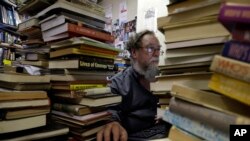For bookseller and writer Griffin Shea, South Africa’s 35-day total lockdown made for a terrible, horrible, no good, very bad month.
Just a week before the lockdown started in late March, he was putting the finishing touches on his downtown Johannesburg store, Bridge Books, which specializes in African literature.
Then everything shut down. Sales plunged 90 percent. The entire industry suffered: two major magazine publishers went out of business.
Now, as South Africa begins to slowly ease the lockdown, books “of educational value” are allowed for sale. But most booksellers are taking a very liberal view of that, because, as a recent open letter signed by thousands of prominent South African writers and intellectuals argues, all books have educational value.
“Under this Level 4 restriction, we're supposed to only be selling educational books, which is not defined,” Shea told VOA. “But for example, at my son's school, they don't have set reading anymore. They go in and propose what they want to read to the teacher and the teacher approves it. So basically, that means we need to be able to sell all novels and all poetry and all long-form nonfiction if we're going to let people read what they need. And especially when you start dealing with children's books, like early childhood education kind of things, a lot of that is all pleasure reading and it's singsong books, and it's really cool ways to do the ABCs. All of that is educational.”
Shea says he’s had no problems from the police since he relaunched internet sales this week. He’s taking precautions in the store, disinfecting books in line with medical recommendations. According to the U.S. Centers for Disease Control and Prevention, some strains of the coronavirus live for only a few minutes on paper, while others live for up to five days. On cardboard, as on book covers, it can live up to 24 hours.
In recent days, Shea says, a few police officers have stopped by his store, checked to make sure he’s observing hygiene measures and enforcing mask-wearing in the store — and then have bought books.
Restless reading in lockdown
This reporter, who is an avid reader, also took the opportunity to immediately order a stack of volumes for home delivery — a textbook on decolonization, a collection of short stories, two children’s books, and a novel by South African writer Ivan Vladislavic, among others. He teaches creative writing at a local university and was one of the letter’s more than 3,300 signatories.
“I'm clearly someone who thinks that books are incredibly important,” he told VOA. “For me, the book is still the most vital carrier of the human story, in all of its complexity and diversity. … And I think it's very important in these times, when people are separated from one another physically and societies are under extreme stress. I think that the windows that books open onto the world become even more important.”
Vladislavic says books have been essential to his lockdown experience. Southern Africa has a rich literary history, featuring Nobel laureates like J.M. Coetzee and newer writers with a range of perspectives, like Lauren Beukes, NoViolet Bulawayo, Zakes Mda and Sisonke Msimang.
Vladislavic says he has recently been immersed in a gripping new dystopian novel by prize-winning South African author Barbara Adair, “Will the Passenger Delaying Flight....”
“It’s a prescient book in that it deals with characters who get stuck in an airport terminal, and it deals with what's happening to them there,” he said. “So it’s something that suits the moment we are in.”
We need real books
But why actual printed books? Writer and activist Elinor Sisulu, who also signed the open letter, runs the Puku Children’s Literature Foundation. Sisulu notes that in highly unequal South Africa, physical, bound books are still vital and should be widely available.
“Physical books are important because some people don't have electricity, they don't have data, they can't share easily,” she said. “We've got older people who've never had, you know, don't have the Kindle or Kobo App. ... So I don't think it's an either/or. I think there must be a space for both. I love my Kindle. I mean, my Kindle is like a person; if I lose my Kindle, I’m distraught. ... But I think the physical books are just as important.”
Sisulu, a champion of African literature, especially works written in local languages, also believes that all books matter.
“Any reading is important,” she said. “Maybe some books are more educational than others. Yes, but then who's to be in charge and decide and say, ‘OK, these are not educational, these are educational'? And how would you know? ... I mean, where is the jury to decide on that?”
Shea says the literary community has realized, in the immortal words of British novelist L.P. Hartley, that “the past is a foreign country; they do things differently there.”
So, Shea says he hopes that this 35-day book drought might even inspire bigger change in South Africa.
“The one thing that I hope will come out of this is that some of the reforms that people have been asking for, readers and people in publishing and people in libraries, is maybe some of these changes can come faster. And so some of the easy wins, I think, would be to declare books essential goods all the time so they would have zero sales tax, zero VAT proposition, the same way, like, food does and essential clothing.”
It would be, he says, a way to turn this worst of times into a better, richer, more hopeful — and definitely more interesting — one.











